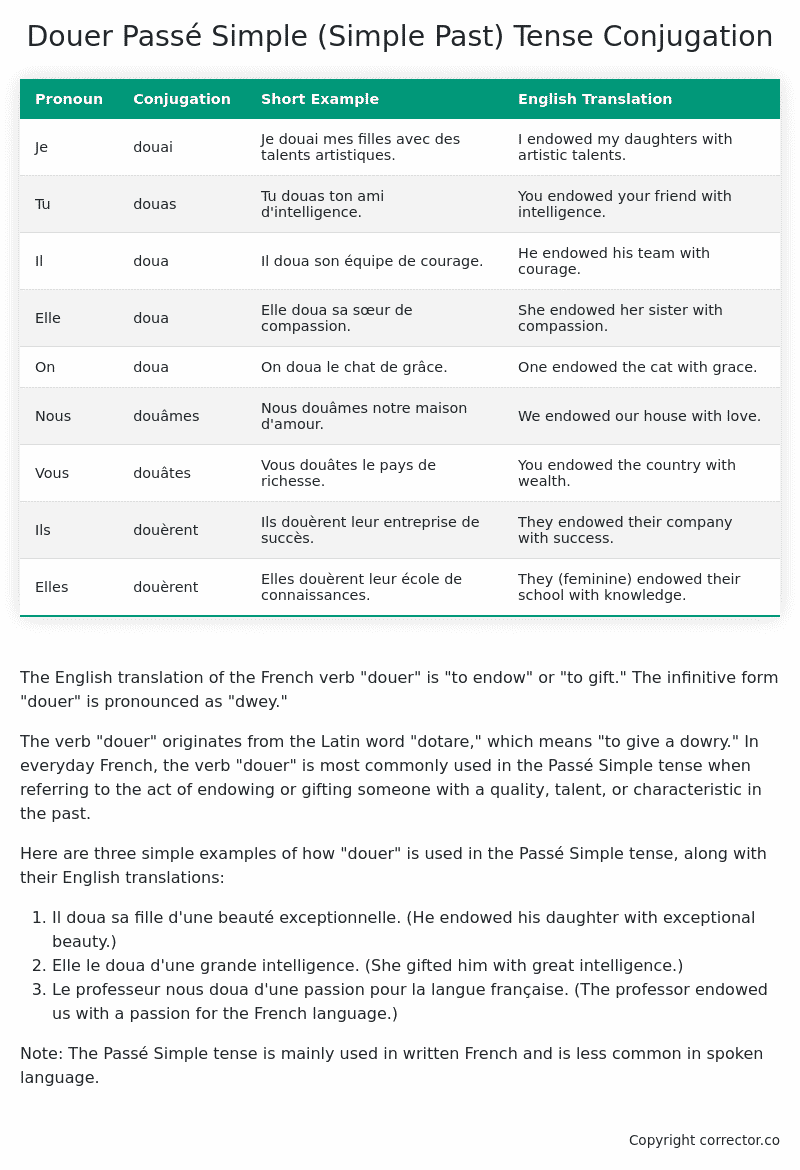Passé Simple (Simple Past) Tense Conjugation of the French Verb douer
Introduction to the verb douer
The English translation of the French verb “douer” is “to endow” or “to gift.” The infinitive form “douer” is pronounced as “dwey.”
The verb “douer” originates from the Latin word “dotare,” which means “to give a dowry.” In everyday French, the verb “douer” is most commonly used in the Passé Simple tense when referring to the act of endowing or gifting someone with a quality, talent, or characteristic in the past.
Here are three simple examples of how “douer” is used in the Passé Simple tense, along with their English translations:
- Il doua sa fille d’une beauté exceptionnelle.
(He endowed his daughter with exceptional beauty.) - Elle le doua d’une grande intelligence.
(She gifted him with great intelligence.) - Le professeur nous doua d’une passion pour la langue française.
(The professor endowed us with a passion for the French language.)
Note: The Passé Simple tense is mainly used in written French and is less common in spoken language.
Table of the Passé Simple (Simple Past) Tense Conjugation of douer
| Pronoun | Conjugation | Short Example | English Translation |
|---|---|---|---|
| Je | douai | Je douai mes filles avec des talents artistiques. | I endowed my daughters with artistic talents. |
| Tu | douas | Tu douas ton ami d’intelligence. | You endowed your friend with intelligence. |
| Il | doua | Il doua son équipe de courage. | He endowed his team with courage. |
| Elle | doua | Elle doua sa sœur de compassion. | She endowed her sister with compassion. |
| On | doua | On doua le chat de grâce. | One endowed the cat with grace. |
| Nous | douâmes | Nous douâmes notre maison d’amour. | We endowed our house with love. |
| Vous | douâtes | Vous douâtes le pays de richesse. | You endowed the country with wealth. |
| Ils | douèrent | Ils douèrent leur entreprise de succès. | They endowed their company with success. |
| Elles | douèrent | Elles douèrent leur école de connaissances. | They (feminine) endowed their school with knowledge. |
Other Conjugations for Douer.
Le Present (Present Tense) Conjugation of the French Verb douer
Imparfait (Imperfect) Tense Conjugation of the French Verb douer
Passé Simple (Simple Past) Tense Conjugation of the French Verb douer (You’re reading it right now!)
Passé Composé (Present Perfect) Tense Conjugation of the French Verb douer
Futur Simple (Simple Future) Tense Conjugation of the French Verb douer
Futur Proche (Near Future) Tense Conjugation of the French Verb douer
Plus-que-parfait (Pluperfect) Tense Conjugation of the French Verb douer
Passé Antérieur (Past Anterior) Tense Conjugation of the French Verb douer
Futur Antérieur (Future Anterior) Tense Conjugation of the French Verb douer
Subjonctif Présent (Subjunctive Present) Tense Conjugation of the French Verb douer
Subjonctif Passé (Subjunctive Past) Tense Conjugation of the French Verb douer
Subjonctif Imparfait (Subjunctive Imperfect) Tense Conjugation of the French Verb douer
Subjonctif Plus-que-parfait (Subjunctive Pluperfect) Tense Conjugation of the French Verb douer
Conditionnel Présent (Conditional Present) Tense Conjugation of the French Verb douer
Conditionnel Passé (Conditional Past) Tense Conjugation of the French Verb douer
Conditionnel Passé II (Conditional Past II) Tense Conjugation of the French Verb douer
L’impératif Présent (Imperative Present) Tense Conjugation of the French Verb douer
L’impératif Passé (Imperative Past) Tense Conjugation of the French Verb douer
L’infinitif Présent (Infinitive Present) Tense Conjugation of the French Verb douer
L’infinitif Passé (Infinitive Past) Tense Conjugation of the French Verb douer
Le Participe Présent (Present Participle) Tense Conjugation of the French Verb douer
Le Participe Passé (Past Participle) Tense Conjugation of the French Verb douer
Struggling with French verbs or the language in general? Why not use our free French Grammar Checker – no registration required!
Get a FREE Download Study Sheet of this Conjugation 🔥
Simply right click the image below, click “save image” and get your free reference for the douer Passé Simple tense conjugation!

Douer – About the French Passé Simple (Simple Past) Tense
Formation
Usage
Narration
Historical Context
Interactions with other tenses
Passé Composé
Imparfait
Conditional and Subjunctive
Summary
I hope you enjoyed this article on the verb douer. Still in a learning mood? Check out another TOTALLY random French verb conjugation!


